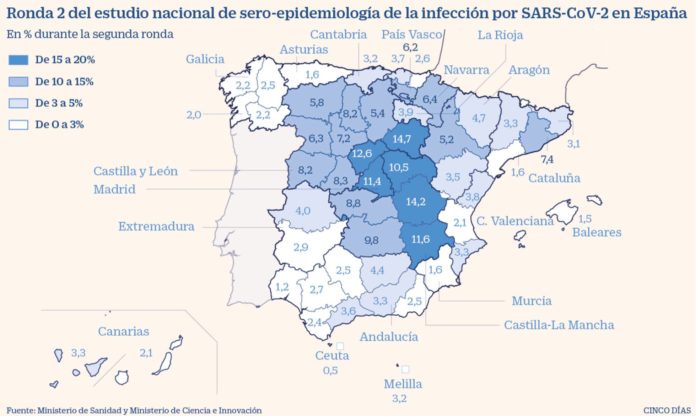- 5.2% of Spaniards have antibodies according to data from the second Seroprevalence study
5.2% of the population has been infected with coronavirus, according to data from the second Seroprevalence study published on Thursday by the Carlos III Health Institute.
This is a minimal increase from the initial figures, which were published on May 13. With sample taken of almost 70,000 participants across the country, the results show a higher participation rate than in the first study, with the estimated prevalence of antibodies increasing from 5% to 5.2%.
The second round of the study was carried out between May 18 and June 1. According to Marina Pollán, director of the National Centre for Epidemiology, experts have observed that “the prevalence is lower in children and young adults.” As for people over 70 years of age, 6.7% of the older population has been infected with the virus.
As in the first wave, the data has also reconfirmed that a third of people with Covid-19 have no symptoms. “They would not visit their medical centre’s to be diagnosed,” said Pollán. But they are people who have a significant impact on transmission. “We must continue to maintain hygiene measures by regularly washing our hands, distance and masks,” said the doctor, “as many of us could be asymptomatic, and with no knowledge of our symptoms.”
The new data also shows that the number of people who showed symptoms similar to the coronavirus have decreased in round 2. “In round 1 we had percentages of people with symptoms compatible with Covid-19 of around 5%, at this time the rate has been reduced, in most of the communities it is less than 1% “.
The Community of Madrid and the nearby provinces are those with the highest percentages. Soria, with 14.7% of the affected population, and Cuenca, with 14.2%, are the two provinces with the highest prevalence of the coronavirus, which was also the case with the data from the first wave. They are followed by Segovia (12.8%), Albacete (11.6%) and Madrid (11.4%).
The least affected province is Huelva, with 1.2%.
Immunity in the province of Alicante is at higher levels than that registered in the province of Valencia, which is 2.1%. In the whole of the Valencian Community, immunity has increased from 2.4% to 2.7% in this second phase of the study.
The president of the Spanish Society of Preventive Medicine, Rafael Ortí, believes that part of the explanation for the increase in immunity that has been registered in the province of Alicante is due to the fact that cases secondary to the outbreak in the Marina Baixa region are now emerging. He blames the increase in coronavirus immunity figures on the arrival of visitors to the province during the Easter holiday period.
According to Fernando Simón, the director of the Health Alerts Coordination Centre, the evolution of the epidemic is positive. “We have a good evolution, with 0.8% transmission in the last weeks.” The third round of the study will begin in a week, and last for another 15 days.





